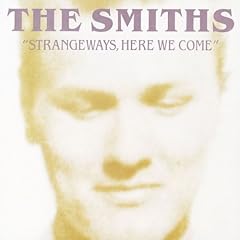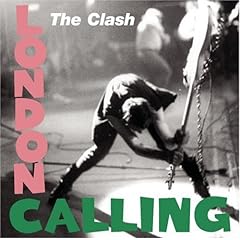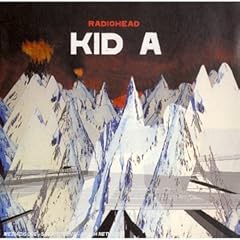The Smiths - Strangeways, Here We Come
The Smiths - Strangeways, Here We Come
by Ian Mathers

So what is the reputation of the Smiths like these days? I once read a theory (of whom I can’t recall) that the Cure had mysteriously turned into one of those bands that all budding music fans make their way through eventually, via old reviews and older kids, but do the Smiths receive same? Has Louder Than Bombs been pressed on anyone you know?
I'm genuinely curious, because they certainly didn't make up part of the milieu I began to get introduced to in high school, and because if the store I work at is any indication, there's not a lot of turnover in Smiths albums. The Beatles, Led Zeppelin, Neil Young, AC/DC, Depeche Mode, and yes, the Cure, all have high turnover here in Guelph: people selling the albums once they're older and have less use for music, replacing them with new remastered copies. Young people snatch them up out of duty rather than devotion.
Part of it is that Smiths fans don't part with Smiths albums. Maybe if I worked in HMV I'd think the band was more a part of the current ad hoc canon, but as far as I’ve personally witnessed, the Smiths aren't much of a touchstone for generations past mine. This could be due to the fact that most of their albums nearly suck.
I'm not knocking the Smiths as a band; their Singles collection is one of the more perfect discs on my shelf, the true and lasting corpus of one of the great British bands of the 20th century. Anyone wondering what I'm on about would do well to check out Mark Simpson's faintly outrageous Saint Morrissey, which in addition to being entertaining correctly and lucidly posits the Smiths as the last in a particular lineage of British band. Among other things (and I know What Was It Anyway? uber-editor Todd Hutlock is with me on this), this entails that the Smiths were among the last bands whose the singles were the really important bit – at least as consumed objects. The albums weren't bad, but they're definitely cases of frustrated potential.
The Queen Is Dead seems to be the canonical choice, but to my mind it's the hardest to sit through because it indulges the Smiths' worst tendencies. Morrissey is so interested in being clever that he forgets to be either funny or touching: “The Boy With the Thorn in His Side” and “There Is a Light That Never Goes Out” tower strikingly above the rest of the album (both singles, naturally), and if the Smiths had never released “Frankly, Mr. Shankly,” “Vicar in a Tutu” or “Some Girls are Bigger Than Others,” I would like the band much more. This is the tic that would go on to swallow Morrissey's solo career whole, and the reason his solo albums tend towards the insufferable (True Fans bleating about the lack of Marr notwithstanding). The Smiths is promising, both a great debut and very uneven, despite boasting “Still Ill,” one of the few truly great Smiths deep cuts, and the less said about Meat Is Murder, the better.
Strangeways, Here We Come, the one that even Wikipedia disses (“had this not been the band's final album, it would have been considered a transitional effort”), actually holds fine. Fittingly enough for such a perverse band, their finest record is also their most atypical.
The glaring thing that rarely gets mentioned, is that this is the least “Smiths-sounding” Smiths album. Again, Marr does all the synthesized heavy lifting under a dumb pseudonym, but those keyboards, synth strings and faux saxes make up a much larger chunk of the sound, to the point where the main sonic interest of “The Death of a Disco Dancer” is the vertiginous one-finger keyboard riff that grates through the back of the track.
Not that the sound is the only appeal; Strangeways, Here We Come is the album where Morrissey is at his funniest mainly because he takes all the songs straight instead of trying so hard to be witty. “Paint a Vulgar Picture” is more than glib record company shenanigans; coming directly after a song where the protagonist commits suicide, the beginning of the track appears to indicate a from-the-grave Morrissey imagining his reception after he's gone, before the rather bravura perspective shift halfway through. The Wiki-ilk must have missed the genuine anguish (some of Moz’s finest!) in “I touched you at the soundcheck / you had no real way of knowing” and the knowing venom in “This was your life, and when it fails to recoup / well, maybe you just haven't earned it yet, baby.”
It's an album chock full of death, a subject Smiths records hardly shrink from (“I Know It's Over,” “Suffer Little Children”), but it's never pervaded like this before. The survivor's/cad's guilt of “Girlfriend in a Coma,” the queasy, broken “Death of a Disco Dancer,” with it's devout hope for peace and love “in the next life,” the romantic homicides of “Unhappy Birthday” and “Death at One's Elbow” – it winds up infecting the rest of these songs as well, so that Morrissey's panicked assertion that he never lied to her in “Stop Me If You Think You've Heard This One Before” feels like the same backpedaling exhibited on “Girlfriend in a Coma.” The immortal “Last Night I Dreamt That Somebody Loved Me” (covered to great effect by Low) would have sounded deathly in any circumstance (and still does on Singles) but here it's positively funereal. Even the two more active tracks that begin the album that feature some of Moz’s campiest growling are more dour than the band’s usual.
And that's the key to my affection for Strangeways, how successfully it sustains mood. The singles here, “I Started Something I Couldn't Finish,” “Girlfriend in a Coma,” “Stop Me If You Think You've Heard This One Before” (unreleased in England, due to a reference to mass murder and unfortunate timing) and “Last Night I Dreamt That Somebody Loved Me,” don't stick out in the egregious way they do on other Smiths albums; I didn't hear Strangeways until long after Singles was assimilated and yet the whole thing flowed from first listen. There's a little sonic variety, some short up-tempo numbers, some lugubrious ballads, dissonances, consonances, and whatever the hell “A Rush and a Push and the Land Is Ours” is. But the deaths and leavings strewn throughout resonate in odd ways, rendering Strangeways, Here We Come bigger than the sum of its parts, a difficult mastery that the Smiths sadly learned only as they themselves broke apart.
Ian Mathers has written for Stylus Magazine, Village Voice and the world's biggest Philip K. Dick fan site. He is currently finishing his Master's degree in Philosophy at the University of Guelph and wishes he had more time to write about music.
by Ian Mathers

So what is the reputation of the Smiths like these days? I once read a theory (of whom I can’t recall) that the Cure had mysteriously turned into one of those bands that all budding music fans make their way through eventually, via old reviews and older kids, but do the Smiths receive same? Has Louder Than Bombs been pressed on anyone you know?
I'm genuinely curious, because they certainly didn't make up part of the milieu I began to get introduced to in high school, and because if the store I work at is any indication, there's not a lot of turnover in Smiths albums. The Beatles, Led Zeppelin, Neil Young, AC/DC, Depeche Mode, and yes, the Cure, all have high turnover here in Guelph: people selling the albums once they're older and have less use for music, replacing them with new remastered copies. Young people snatch them up out of duty rather than devotion.
Part of it is that Smiths fans don't part with Smiths albums. Maybe if I worked in HMV I'd think the band was more a part of the current ad hoc canon, but as far as I’ve personally witnessed, the Smiths aren't much of a touchstone for generations past mine. This could be due to the fact that most of their albums nearly suck.
I'm not knocking the Smiths as a band; their Singles collection is one of the more perfect discs on my shelf, the true and lasting corpus of one of the great British bands of the 20th century. Anyone wondering what I'm on about would do well to check out Mark Simpson's faintly outrageous Saint Morrissey, which in addition to being entertaining correctly and lucidly posits the Smiths as the last in a particular lineage of British band. Among other things (and I know What Was It Anyway? uber-editor Todd Hutlock is with me on this), this entails that the Smiths were among the last bands whose the singles were the really important bit – at least as consumed objects. The albums weren't bad, but they're definitely cases of frustrated potential.
The Queen Is Dead seems to be the canonical choice, but to my mind it's the hardest to sit through because it indulges the Smiths' worst tendencies. Morrissey is so interested in being clever that he forgets to be either funny or touching: “The Boy With the Thorn in His Side” and “There Is a Light That Never Goes Out” tower strikingly above the rest of the album (both singles, naturally), and if the Smiths had never released “Frankly, Mr. Shankly,” “Vicar in a Tutu” or “Some Girls are Bigger Than Others,” I would like the band much more. This is the tic that would go on to swallow Morrissey's solo career whole, and the reason his solo albums tend towards the insufferable (True Fans bleating about the lack of Marr notwithstanding). The Smiths is promising, both a great debut and very uneven, despite boasting “Still Ill,” one of the few truly great Smiths deep cuts, and the less said about Meat Is Murder, the better.
Strangeways, Here We Come, the one that even Wikipedia disses (“had this not been the band's final album, it would have been considered a transitional effort”), actually holds fine. Fittingly enough for such a perverse band, their finest record is also their most atypical.
The glaring thing that rarely gets mentioned, is that this is the least “Smiths-sounding” Smiths album. Again, Marr does all the synthesized heavy lifting under a dumb pseudonym, but those keyboards, synth strings and faux saxes make up a much larger chunk of the sound, to the point where the main sonic interest of “The Death of a Disco Dancer” is the vertiginous one-finger keyboard riff that grates through the back of the track.
Not that the sound is the only appeal; Strangeways, Here We Come is the album where Morrissey is at his funniest mainly because he takes all the songs straight instead of trying so hard to be witty. “Paint a Vulgar Picture” is more than glib record company shenanigans; coming directly after a song where the protagonist commits suicide, the beginning of the track appears to indicate a from-the-grave Morrissey imagining his reception after he's gone, before the rather bravura perspective shift halfway through. The Wiki-ilk must have missed the genuine anguish (some of Moz’s finest!) in “I touched you at the soundcheck / you had no real way of knowing” and the knowing venom in “This was your life, and when it fails to recoup / well, maybe you just haven't earned it yet, baby.”
It's an album chock full of death, a subject Smiths records hardly shrink from (“I Know It's Over,” “Suffer Little Children”), but it's never pervaded like this before. The survivor's/cad's guilt of “Girlfriend in a Coma,” the queasy, broken “Death of a Disco Dancer,” with it's devout hope for peace and love “in the next life,” the romantic homicides of “Unhappy Birthday” and “Death at One's Elbow” – it winds up infecting the rest of these songs as well, so that Morrissey's panicked assertion that he never lied to her in “Stop Me If You Think You've Heard This One Before” feels like the same backpedaling exhibited on “Girlfriend in a Coma.” The immortal “Last Night I Dreamt That Somebody Loved Me” (covered to great effect by Low) would have sounded deathly in any circumstance (and still does on Singles) but here it's positively funereal. Even the two more active tracks that begin the album that feature some of Moz’s campiest growling are more dour than the band’s usual.
And that's the key to my affection for Strangeways, how successfully it sustains mood. The singles here, “I Started Something I Couldn't Finish,” “Girlfriend in a Coma,” “Stop Me If You Think You've Heard This One Before” (unreleased in England, due to a reference to mass murder and unfortunate timing) and “Last Night I Dreamt That Somebody Loved Me,” don't stick out in the egregious way they do on other Smiths albums; I didn't hear Strangeways until long after Singles was assimilated and yet the whole thing flowed from first listen. There's a little sonic variety, some short up-tempo numbers, some lugubrious ballads, dissonances, consonances, and whatever the hell “A Rush and a Push and the Land Is Ours” is. But the deaths and leavings strewn throughout resonate in odd ways, rendering Strangeways, Here We Come bigger than the sum of its parts, a difficult mastery that the Smiths sadly learned only as they themselves broke apart.
Ian Mathers has written for Stylus Magazine, Village Voice and the world's biggest Philip K. Dick fan site. He is currently finishing his Master's degree in Philosophy at the University of Guelph and wishes he had more time to write about music.
Labels: Ian Mathers





